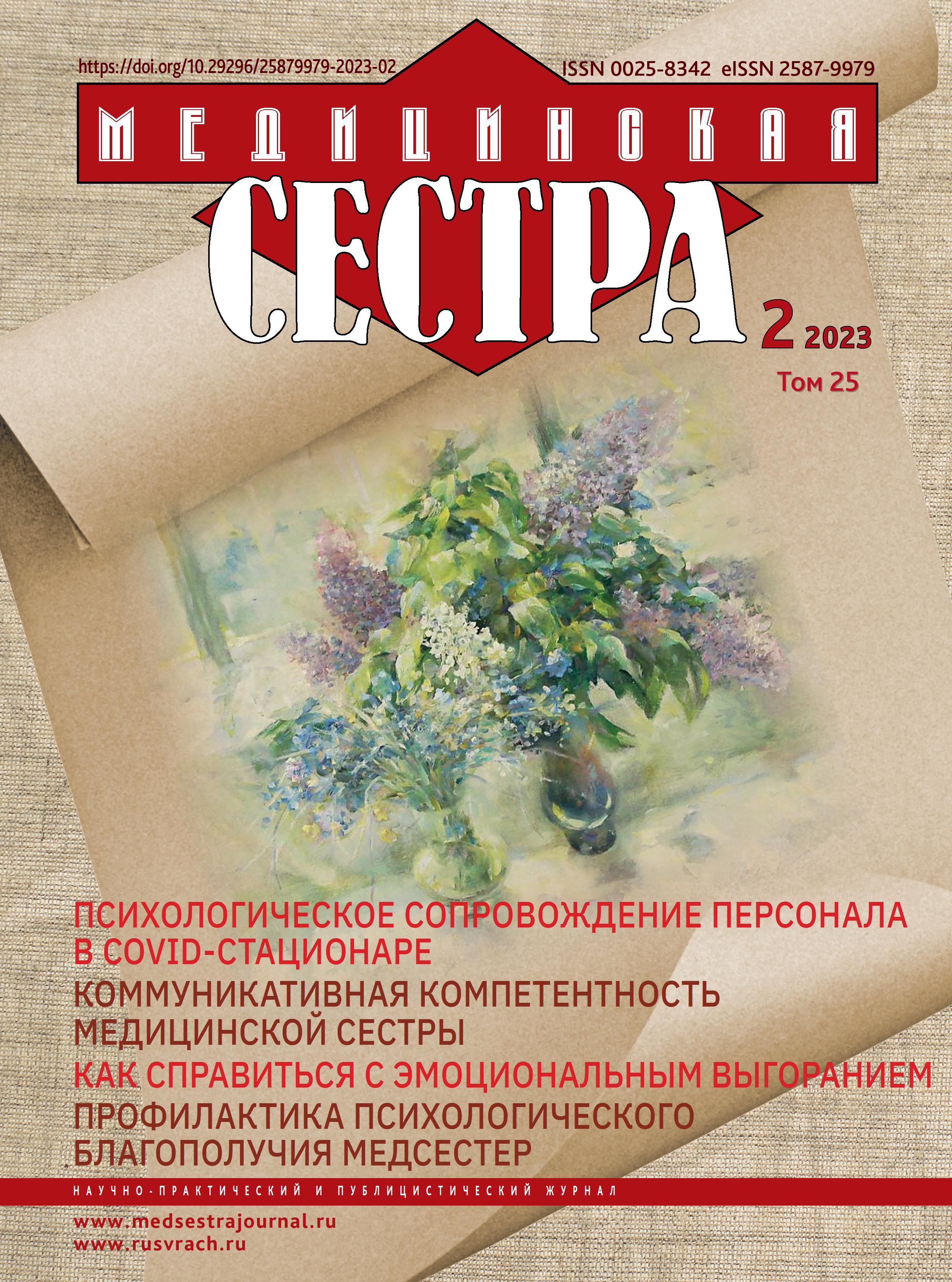Выраженность психосоматических расстройств у медсестер хосписа. Способы профилактики и коррекции
- Авторы: Эверт Л.С.1,2, Потупчик Т.В.3, Корман Я.В.3, Полубояринов П.А.4, Федоров А.В.5
-
Учреждения:
- ФГБНУ «Федеральный исследовательский центр «Красноярский научный центр Сибирского отделения Российской академии наук», Научно-исследовательский институт медицинских проблем Севера – обособленное подразделение ФИЦ КНЦ СО РАН
- Хакасский государственный университет им. Н.Ф. Катанова
- ФГБОУ ВО «Красноярский государственный медицинский университет имени проф. В.Ф. Войно-Ясенецкого» МЗ РФ
- ФГБОУ ВО Пензенский государственный университет
- ФГБОУ ВО «Пензенский государственный аграрный университет»
- Выпуск: Том 25, № 2 (2023)
- Страницы: 33-38
- Раздел: Вопросы профилактики
- URL: https://journals.eco-vector.com/0025-8342/article/view/321556
- DOI: https://doi.org/10.29296/25879979-2023-02-06
- ID: 321556
Цитировать
Полный текст
Аннотация
Проведен обзор сведений о наиболее часто встречающихся психосоматических расстройствах у медицинских сестер хосписа. Наиболее выраженными проявлениями являются усталость, слабая концентрация внимания и внутреннее беспокойство, гнев и раздражительность, повышенная тревожность, агрессия. Освещены различные меры профилактики, включающие эмоциональную и психологическую поддержку медицинского персонала, соблюдение общих рекомендаций по соблюдению здорового образа жизни. Предложены способы медикаментозной коррекции стрессовых состояний с помощью применения препаратов магния и седативных фитопрепаратов, таких как Нерво-вит.
Ключевые слова
Полный текст
Об авторах
Лидия Семёновна Эверт
ФГБНУ «Федеральный исследовательский центр «Красноярский научный центр Сибирского отделения Российской академии наук», Научно-исследовательский институт медицинских проблем Севера – обособленное подразделение ФИЦ КНЦ СО РАН; Хакасский государственный университет им. Н.Ф. Катанова
Автор, ответственный за переписку.
Email: lidiya_evert@mail.ru
ORCID iD: 0000-0003-0665-7428
доктор медицинских наук, главный научный сотрудник клинического отделения соматического и психического здоровья детей, профессор кафедры общепрофессиональных дисциплин, Медицинский институт
Россия, Красноярск; Абакан, Республика ХакасияТатьяна Витальевна Потупчик
ФГБОУ ВО «Красноярский государственный медицинский университет имени проф. В.Ф. Войно-Ясенецкого» МЗ РФ
Email: potupchik_tatyana@mail.ru
ORCID iD: 0000-0003-1133-4447
кандидат медицинских наук, доцент
Россия, КрасноярскЯдвига Васильевна Корман
ФГБОУ ВО «Красноярский государственный медицинский университет имени проф. В.Ф. Войно-Ясенецкого» МЗ РФ
Email: yadvigakorma@mail.ru
преподаватель отделения «Сестринское дело», Фармацевтический колледж
Россия, КрасноярскПавел Аркадьевич Полубояринов
ФГБОУ ВО Пензенский государственный университет
Email: poluboyarinovpavel@yandex.ru
ORCID iD: 0000-0001-9870-0272
кандидат сельскохозяйственных наук, доцент, доцент кафедры «Общая и клиническая фармакология»
Россия, ПензаАлександр Викторович Федоров
ФГБОУ ВО «Пензенский государственный аграрный университет»
Email: potupchik_tatyana@mail.ru
учёный агроном
Россия, ПензаСписок литературы
- Горелик С.Г. Реабилитация пациентов пожилого и старческого возраста. Врач. 2014; 6: 82–84.
- Голенков A.B. Удовлетворенность работой и терминальные ценности у медицинских сестер. Главная медицинская сестра. 2009; 11:137–146.
- Новиков Г.А., Рудой C.B., Вайсман М.А. Паллиативная помощь больным с тяжелой хронической сердечной недостаточностью. Паллиативная медицина и реабилитация. 2008; 4: 5–10.
- Лазарева Е.Ю., Николаева Е.Л. Психологические особенности эмоционального выгорания у среднего медицинского персонала психиатрического учреждения. Вестник психиатрии и психологии Чувашии. 2013; 9: 69–78.
- Пожилой человек. Сестринский уход. Пособие для медицинских сестер. Под ред.В.Н. Петрова. - СПб.: Диля, 2006; 416.
- Эккерт, Н.В. Методические рекомендации по организации паллиативной помощи от 22.09.2008 №7180-РХ. / Н.В. Эккерт, Г.А. Новиков, А.К. Хетогурова, М.Г. Шарафутдинов. [Электронный ресурс]. Электронный фонд правовых и нормативно-технических документов. 1991-2021. Электр. дан. Режим доступа: https://docs.cntd.ru/document/420258887/.
- Шилова Т.Т., Медведева Е.М. Психологические проблемы медсестер. Медицинская сестра. 2011; 3: 31–33.
- Потупчик Т.В., Корман Я.В. Социально-психологический статус пациентов и медсестер хосписа. Медицинская сестра. 2017; 8: 31–33.
- Казанцева Н.В. Особенности профилактики синдрома эмоционального выгорания у медицинских сестер в паллиативной медицине. Материалы XIV Международной студенческой научной конференции «Студенческий научный форум» URL: https://scienceforum.ru/2022/article/2018029430.
- Захарова В., Творогова Т.М., Пшеничникова И.И. Современные рекомендации по диагностике и лечению вегетативной дистонии у детей и подростков. Медицинский совет. 2016; (16): 116–123. doi: 10.21518/2079-701X-2016-16-116-123.
- Аскалонова С.Б. К вопросу о методах коррекции состояний стресса. Вестник Марийского государственного университета. 2015;3(18):8–12.
- Акарачкова Е.С., Вершинина С.В., Котова О.В. и др. Основы терапии и профилактики стресса и его последствий у детей и подростков. Вопросы современной педиатрии. 2013; 12: 38–44.
- Захарова И.Н., Ершова И.Б., Творогова Т.М. и др. Стресс у детей и подростков - проблема сегодняшнего дня. Медицинский совет. 2021; 1: 237–246. doi: 10.21518/2079-701X-2021-1-237-246
- Государственный реестр лекарственных средств URL: https://grls.rosminzdrav.ru/
- Калачева А.Г. Элемент-специфические индикаторы нейротропных функций магния. Москва, 2011.
- Hanni A. Magnesium and the insulin resistance syndrome. Acta Universitatis Upsaliensis, 2001.
- Захарова И.Н., Творогова Т.М., Пшеничникова И.И. и др. Стресс и стресс-индуцированные расстройства у детей. Медицинский совет. 2018; 11: 110–116. doi: 10.21518/2079-701.
- Бокова Е.C., Березняков А.В. Есть ли будущее у седативных препаратов растительного происхождения? VIII Международная студенческая научная конференция. Студенческий научный форум – 2016. URL: https://scienceforum.ru/2016/article/2016021440.
- Кукушкин А.В. Применение фитопрепарата «НЕРВО-ВИТ» в лечении пациентов с психовегетативным синдромом. Неврология/ревматология Спецвыпуск. 2017; 3: 29–32.
- Барнаулов О.Д., Поспелова М.Л. Фитотерапия в неврологии. СПб.: Н-Л., 2009.
- Balch P.A. Prescription for nutritional healing (A practical A-to-Z reference to drug-free remedies using vitamins, minerals, herbs & food supplements). 4th ed. New York. Avery. A member of Penguin Group (USA) Inc., 2006.
- Shikov A., Pozharitskaya O., Makarov V. et al. Effect of Leonurus cardiac oil extract in patients with arterial hypertension accompanied by anxiety and sleep disorders. Phytother. Res. 2011; 25(4): 540–543. doi: 10.1002/ptr.3292.
- Потупчик Т.В., Эверт Л.С., Ахмельдинова Ю.Р. Применение нативного коллагена 2-го типа в составе комплексного средства Живели Флекс Актив. Врач. 2018; 12: 33–37. DOI: https://doi.org/10.29296/25877305-2018-12-08
- Горьков В.А., Раюшкин В.А., Олейчик И.В. и др. Фитотерапия умеренных депрессий препаратами зверобоя (аналитический обзор). Психиатрия и психофармакотерапия. 2000; 2(6): 184–187.
- Елистратов Д.Г., Григорьев К.И. Фитотерапия в лечении депрессивных состояний у подростков. Врач. 2022; 9: 32–35. DOI: https://doi.org/102929 6/25877305- 2022- 09- 05.
- Кукушкин А.В., Савельев В.П., Елистратов Д.Г. Опыт применения препарата «Нерво-Вит» в лечении психовегетативного синдрома у больных с пограничными психическими расстройствами. В сборнике: Острые нарушения мозгового кровообращения. Вопросы диагностики, лечения, реабилитации. Материалы межрегиональной научно-практической конференции. 2018; 69–74.
- Полубояринов П.А., Елистратов Д.Г. Инновации компании «ПАРАФАРМ» в выращивании лекарственных растений и их переработке. Медицинская сестра. 2022; 7(24): 27–30.
- Елистратов Д.Г. Лекарственное средство. Патент на изобретение RU 2342943 C2, 10.01.2009. Заявка №2006144598/15 от 15.12.2006.
Дополнительные файлы






